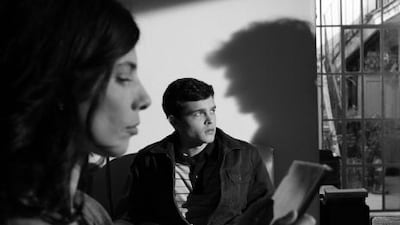Director: Francis Ford Coppola
Starring: Vincent Gallo, Alden Ehrenreich, Maribel Verdú
***
Given that he's involved his relatives so much in his films, it's no wonder Francis Ford Coppola is obsessed with family dynamics. In Apocalypse Now, Martin Sheen's Captain Willard played a sort of surrogate father to a group of young and frightened recruits, watching them crumble under pressure and follow him towards madness. Then there was The Godfather trilogy, which follows the intense saga of perhaps the most famous fictitious family ever. And his latest effort, Tetro, which first hit cinemas in 2009 and is out now on DVD in the UAE, again takes on the issues, this time with artistic greatness as the central theme, that have become Coppola's staple.
Set in Buenos Aires, Tetro starts with the 17-year-old Bennie (Alden Ehrenreich) unexpectedly turning up on the doorstep of his much loved and much older half brother Tetro, played by Vincent Gallo. A sullen, anguished soul, Tetro's fractious relationship with his father (a successful orchestra conductor and towering ego seen through a series of flashbacks) has forced him to flee his brother and his hometown of New York for a bohemian existence of late mornings and coffee shops in Argentina.
Remembering the brother as the vibrant and creative talent he once was, Bennie attempts to revitalise Tetro through his now-forgotten writings. Unfortunately, this troubled soul, described by his loving girlfriend Miranda (Maribel Verdú) as "like a genius, but without enough accomplishments", is happier to keep his former promise under lock and key (in this case a scruffy case full of papers covered in scrawlings that clearly use the "tortured" font). Confronted with Tetro's stubborn resistance to reflect on his past, Bennie goes it alone.
Having found his brother's unfinished script describing his overbearing father, he suddenly becomes a playwright, pens his own ending and puts it on the stage, with predictable (and rather cheesy) success. But even Tetro's new acclaim in the arts scene (led by the bizarre critic known as "Alone") isn't enough to contain his rage at Bennie, hinting at a central mystery holding everything together.
Shot in widescreen in black-and-white digital video, Tetro's only colour appears in the flashbacks, adding shades to the secretive back story to the elder brother's guarded character. Through the monochrome lens, Buenos Aires appears a fascinating and alluring backdrop, while a trip into the countryside sees the icy tops of the Andes flicker enticingly.
But despite the technical mastery displayed, plus some excellent performances, most notably from the newcomer Ehrenreich, the drama wobbles under the weight of its own attempts at magnitude. Heavily laboured, somewhat self-indulgent and rather strange in parts, Tetro has been described by Coppola as his most personal film to date.
Whether this has any reflection on the creative strains he had with his own father, a composer who co-wrote many of the scores to the Godfather trilogy and Apocalypse Now, or his children (either the Academy Award winning Sofia or Roman, who is second-unit director on Tetro), we're not entirely sure.
In any case, Tetro isn't bad. In fact, it's rather great in parts. But it just isn't as deep as it wants to be. Perhaps some matters are better kept in the family.

